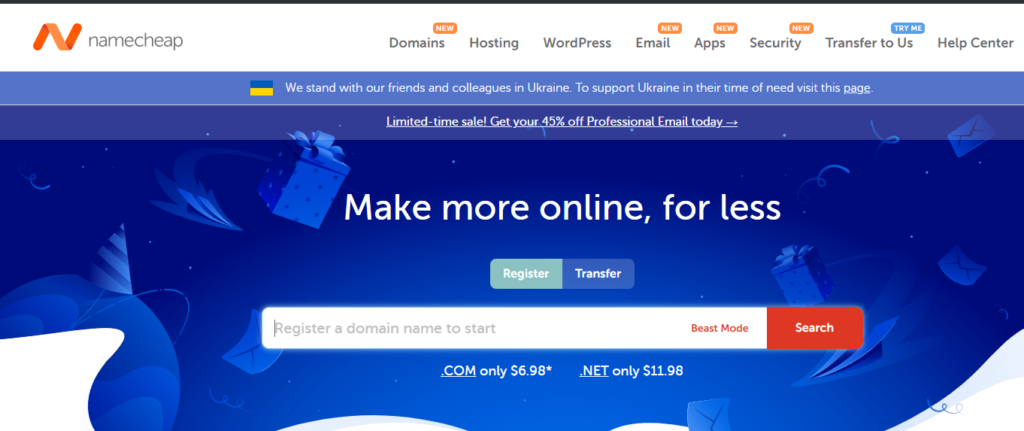Table of Contents
What are the different domain name types?
Why must you have a domain for your website?
Six Criteria for the perfect domain name
What is a domain name?
Are you curious about what a domain name is? Well, let me explain.
A domain name is the unique address of a website that allows users to access it on the internet. It’s the name that you type into your web browser’s address bar to visit a specific website. For example, the domain name for Google is google.com.

Every domain name consists of two parts – the actual name of the website and the extension, also known as the top-level domain (TLD). The TLD can be anything from .com, .org, .net, .edu, and so on.
What are the different domain name types?
Domain names come in various types, each with its unique characteristics. Here are some of the most common types:
- Top-Level Domains (TLDs): These are the most commonly used domains, typically representing different countries or generic categories. Some examples of TLDs include .com, .org, .net, .edu, and .gov.
- Country Code Top-Level Domains (ccTLDs): These domains are specific to a particular country or region. For example, .us is the ccTLD for the United States, and .ca is the ccTLD for Canada.
- Generic Top-Level Domains (gTLDs): These are newer TLDs introduced in recent years to provide more options for domain names. Some examples of gTLDs include .blog, .guru, .club, .shop, and .online.
- Second-Level Domains: These domains come before the TLD and can be used to create unique domain names. For example, in the domain name “google.com,” “google” is the second-level domain.
- Third-Level Domains: These domains come before the second-level domain and are used to customize domain names further. For example, in the domain name “mail.google.com,” “mail” is the third-level domain.
It’s important to choose the right domain type for your website based on your target audience and the purpose of your website. Each type of domain has its benefits and limitations.
Why must you have a domain for your website?
Choosing a domain name is an important part of creating a website as it serves as your website’s identity on the internet. It should be easy to remember, easy to spell, and relevant to the content of your website.
Are you wondering why having a domain name is essential for your website?
First and foremost, a domain name gives your website an identity online. It is the address that people will use to access your website. A unique and memorable domain name can help your website stand out from the competition and make it easier for people to remember and find.

Having your domain name also gives you control over your website’s brand and online presence. You can choose a name that aligns with your business or personal brand and use it consistently across all online platforms. This can help with building brand recognition and authority.
Furthermore, having your domain name allows you to have a professional email address with your domain name as the extension. This can help you project a more professional image to your customers or clients than a generic email address.
Finally, having a domain name can also improve your website’s search engine optimization (SEO) and help it rank higher in search engine results. Search engines often give more weight to websites with their domain names.
In summary, having a domain name is crucial for establishing a professional online presence, building brand recognition, and improving SEO.
How to get a domain?
If you’ve decided you want a new website, you need a domain automatically. And yes, you’re probably wondering how to get one. Don’t worry; the process is simple!
Many domain registrars allow you to purchase a domain name; some of the popular ones include:
1. GoDaddy is one of the largest domain registrars in the world, offering a wide range of domain names with competitive pricing.

2. Namecheap is another popular domain registrar offering affordable domain names and reliable customer support.

3. Bluehost – If you’re looking for a domain registrar and web hosting provider, Bluehost is a great option. They offer free domain name registration with their hosting plans.

4. Hostinger – It offers a variety of domain names with competitive pricing and easy domain management tools.

When selecting a domain registrar, consider factors like pricing, customer support, domain management tools, and any additional services they offer.
To purchase a domain, you’ll need to search for an available domain name, select a domain extension, and complete the registration process. Some domain registrars may offer additional services like privacy protection, website builders, and email hosting.
Six Criteria for the perfect domain name
Choosing the perfect domain name can be difficult, but it’s essential for creating a strong online presence. Here are some criteria to consider when selecting a domain name:
- Easy to spell and pronounce – You want your domain name to be memorable, starting with being easy to spell and pronounce. This makes it easier for your audience to share your domain name with others.
- Short and simple – A domain name that’s short and simple is easier to remember and type in. Aim for no more than 2-3 words, and avoid using hyphens or numbers.
- Relevant to your brand – Your domain name should reflect your brand identity, making it easier for potential customers to identify and remember you.
- Avoid trademark infringement – Do your research and ensure that your domain name doesn’t infringe on any existing trademarks. This could lead to legal trouble down the road.
- Use .com: If possible, use a top-level domain like « .com » for an international brand or website. If you are a local business, it’s good enough to take the country code domain ending (e.g., for Germany, it’s « .de »)
- Consider SEO – Including relevant keywords in your domain name can boost your search engine rankings and increase visibility online.
What is Domain Investing?
Domain investing is where individuals or companies buy domain names to resell them at a profit. It’s essentially like buying real estate or stocks, hoping to sell it later at a higher price.
Domain investors research and purchase domain names that they believe have the potential to be in high demand in the future.
Domain investing can be a lucrative business, but it also requires a lot of research and knowledge about the market. A good domain investor needs to spot trends and understand what types of domain names will be in demand in the future.


